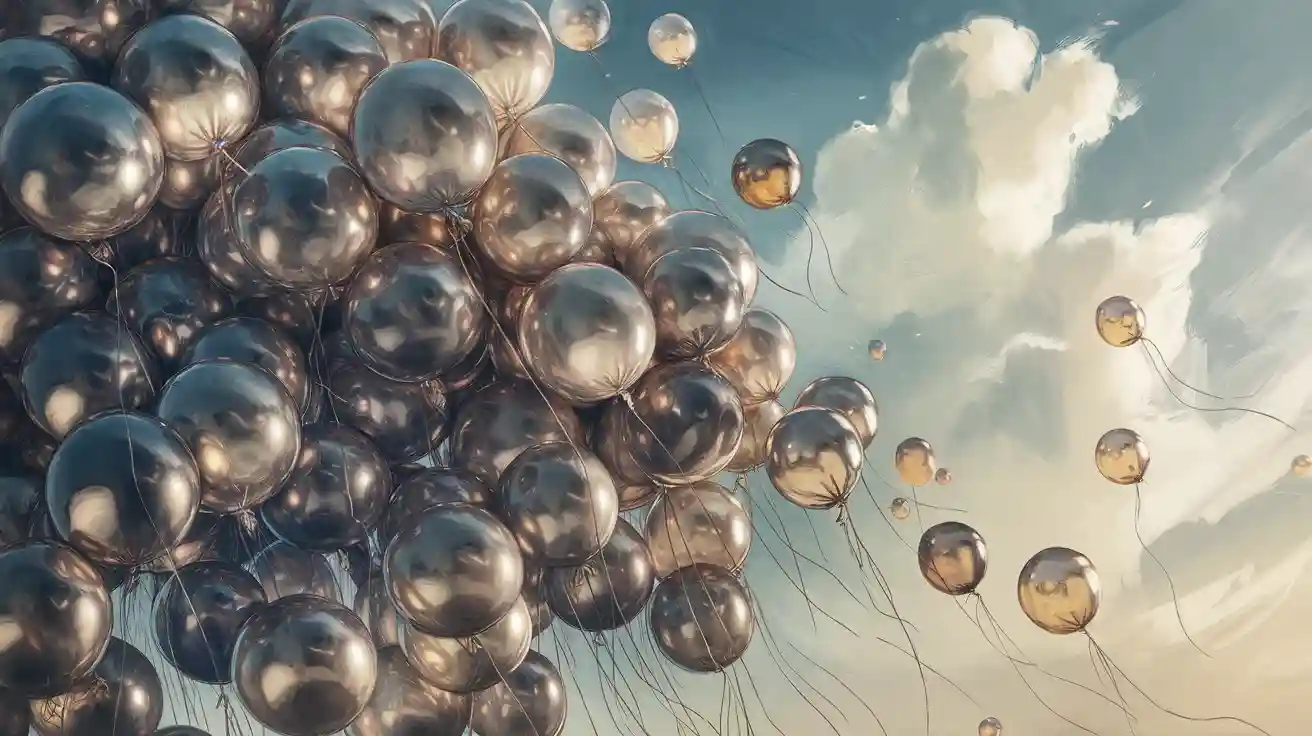
Helium-filled latex balloons bring joy to any celebration, but their float time depends on several factors. Typically, these balloons stay afloat for 8 to 12 hours. With extra care, such as applying Hi-Float, you can extend their life expectancy to 2 or 3 days. Other types of helium-filled balloons last even longer. For example:
Latex balloons: 8-12 hours
Foil balloons: 2-5 days
Bubble balloons: 2-4 weeks
The float time of helium balloons also depends on their size, the quality of helium, and environmental conditions. By understanding these factors, you can ensure your balloons last as long as possible for your event.
Key Takeaways
Latex balloons typically float for 8-12 hours. Use Hi-Float to extend their float time to 2-3 days.
Bigger balloons float longer. Choose larger sizes for events that require longer-lasting decorations.
Store balloons in a cool, shaded place. This helps prevent helium loss and keeps them looking fresh.
Inflate balloons close to the event time. This maximizes their float time and ensures they look their best.
Seal balloons tightly to prevent helium leaks. A good knot or balloon clip can make a big difference in float duration.
Factors That Affect How Long Latex Balloons Float
Balloon Size and Material
The size and material of a balloon affect its float time. Bigger latex balloons float longer because they hold more helium. For example, an 11-inch balloon can float for 18-24 hours. Smaller balloons lose helium faster since they hold less.
The material also matters. Latex balloons let helium escape faster because they are porous. This is why they don’t float as long as foil balloons. To make latex balloons last longer, use bigger sizes or treat them with Hi-Float.
Factor |
Description |
|---|---|
Type of Balloon |
|
Size |
Bigger balloons float longer than smaller ones. |
Treatment with Hi-Float |
Hi-Float helps balloons stay inflated longer. |
Quality and Amount of Helium
The type and amount of helium used affect how long balloons float. High-quality helium keeps balloons inflated longer. Low-quality helium may have impurities that shorten float time.
Using the right amount of helium is also important. If balloons are underinflated, they won’t float well. Overinflated balloons might pop. Inflate balloons to the correct size and seal them tightly to keep helium inside.
Environmental Conditions (Temperature, Humidity, and Sunlight)
Weather conditions like temperature, humidity, and sunlight affect float time. Warm air makes helium expand, causing balloons to lose helium faster. Cooler air helps balloons hold helium longer.
Humidity also matters. High humidity makes it harder for balloons to float. Sunlight damages latex, making balloons deflate faster. To keep balloons floating longer, store them in a cool place away from sunlight.
Environmental Factor |
Effect on Float Time |
|---|---|
Humidity |
Makes it harder for balloons to float. |
Temperature |
Warm air causes helium to escape faster. |
Sunlight |
Damages latex, reducing float time. |
Proper Sealing and Prevention of Leakage
Sealing latex balloons well helps them float longer. Helium is tiny and light, so it escapes easily. If you stop leaks, your balloons will stay up and look great.
To keep helium inside, seal the balloon's neck tightly. Use strong ties or tight knots to block gaps. Check the seal to ensure no air escapes. Even a small hole can make the balloon float for less time.
The balloon's quality also matters. Weak seams or tiny holes let helium out faster. Look for defects before inflating. Avoid balloons that stretch too much, as they lose helium quicker.
You can also try a double envelope system. Put one balloon inside another to trap escaping helium. This method takes more work but helps balloons last longer.
Tip: Be gentle when inflating and sealing balloons. Rough handling can cause tears or weaken the material, letting helium escape.
By sealing balloons properly and stopping leaks, they will float longer. These easy steps keep your decorations looking great for your party.
Tips to Make Latex Balloons Float Longer
Use Hi-Float or Similar Products
Hi-Float is a liquid that coats the balloon inside. It slows down how fast helium escapes. Apply Hi-Float before inflating to make balloons last longer. This is great for events lasting more than one day. To use, put a small amount inside the balloon. Spread it evenly, then inflate. Follow the package directions for the best results.
If you don’t have Hi-Float, try similar products. These also help balloons stay up longer. Using these treatments keeps your decorations looking great for your event.
Inflate Balloons Close to Event Time
Inflate balloons close to when your event starts. Helium escapes quickly, so inflating too early shortens float time. For the best results, inflate them just before the event begins.
If you need to prepare early, use Hi-Float or bigger balloons. Bigger balloons hold helium longer. This way, your balloons will stay fresh and float through your celebration.
Keep Balloons in a Cool Place Indoors
Where you store balloons affects how long they float. Heat makes helium escape faster, and sunlight weakens latex. Keep balloons in a cool, shaded indoor spot to make them last longer.
Don’t place them near windows, heaters, or anything hot. If your event is outside, keep balloons in the shade until it starts. Storing them properly helps them look good and float longer.
Tip: Use a covered car to move balloons. This protects them from heat and sunlight.
Don't Overinflate or Underinflate Balloons
Blowing up balloons to the right size is very important. If you overinflate, the latex stretches too much and leaks helium faster. If you underinflate, there’s not enough helium, so they don’t float long. Getting the size just right helps balloons stay up longer.
Research shows proper inflation makes latex balloons last much longer. The table below shows how inflation and other factors affect float time:
Factor |
Effect on Float Time |
|---|---|
Correct Inflation |
Helps balloons float much longer |
Hi-Float Use |
Makes balloons last up to 25 times longer |
Weather Conditions |
Heat stretches latex; cold shrinks it; sunlight and humidity weaken it |
To inflate balloons perfectly, use a balloon sizer or template. These tools help you blow them up to the right size. For example, an 11-inch balloon should be exactly 11 inches wide. Don’t guess, as it often leads to mistakes.
Tip: Inflate balloons slowly and evenly. This prevents overinflation and keeps the latex strong.
Tie Balloons Well to Keep Helium Inside
Tying balloons tightly is key to keeping helium from escaping. Even a tiny gap in the knot can let helium out, making the balloon float less. To tie properly, pinch the neck and make a tight knot. Double knots add extra security and stop leaks.
You can also use balloon clips or sealing tools. These create airtight seals, which are great for big events. If tying by hand, make sure the knot is tight with no gaps.
Check balloons for weak spots or small holes before tying. Faulty latex can leak helium, even with a good knot. High-quality balloons are less likely to have these problems, so pick trusted brands.
Note: Don’t tie balloons too tightly to strings or weights. Too much tension can stretch the neck and cause leaks.
By inflating and tying balloons correctly, you’ll make them float longer. This keeps your decorations looking great for your event.
How to Plan for Events with Latex Balloons
Timing Balloon Inflation for Maximum Float Time
Inflate balloons close to your event for the best results. Latex balloons usually float for 8 to 12 hours. Use Hi-Float or larger balloons to make them last longer. If your event lasts several days, you might need to refill or replace balloons. This keeps them looking good.
Store inflated balloons in a cool indoor spot if preparing early. This slows helium loss and keeps them floating longer. Don’t inflate balloons too early, or they might deflate before the event. Proper timing helps your decorations stay fresh and colorful.
Choosing the Right Balloon Size for Longevity
Bigger balloons float longer because they hold more helium. For example, an 11-inch balloon can float up to 24 hours. Smaller balloons may only last a few hours.
Pick balloon sizes based on how long you need them to float. Small balloons are fine for short events. For longer events, use bigger balloons or Hi-Float to extend float time. Choosing the right size keeps your decorations looking great.
Preparing for Outdoor vs. Indoor Events
Outdoor events need extra care to keep balloons looking nice. Use bigger balloons and don’t overinflate them to avoid popping. Inflate them at the same temperature as the outdoor setting. Light-colored balloons work better outside since they absorb less heat.
Wind and weather can affect outdoor balloons. Use heavy weights to stop them from flying away. Keep balloons away from sharp objects that could pop them. For indoor events, regular weights and inflation work fine. Plan carefully to keep balloons safe in any location.
Tip: Use a covered car to move balloons. This protects them from heat and sunlight.
Helium-filled latex balloons usually float for 8-12 hours. You can make them last longer with proper care. Use Hi-Float, inflate them correctly, and store them indoors. Keep them in cool places to extend their float time. Plan your event well and follow these simple tips. This helps your balloons stay fresh and colorful longer. These steps make your celebration more memorable and fun.
FAQ
How do you know if a balloon is inflated right?
Use a balloon sizer to check the balloon's size. For example, an 11-inch balloon should measure exactly 11 inches. Don’t overinflate, as it stretches the latex too much. Avoid underinflating, as it shortens how long it floats.
Can helium from popped balloons be used again?
No, you can’t reuse helium from popped balloons. Once helium escapes, it mixes with the air and is gone. To save helium, only inflate balloons when needed. Seal them tightly to stop leaks.
Why do latex balloons lose helium faster than foil ones?
Latex has tiny holes that let helium escape quickly. Foil balloons don’t have these holes, so they hold helium longer. Using Hi-Float on latex balloons can slow helium loss.
How should you move helium-filled balloons safely?
Use a covered car to keep balloons out of sunlight and heat. Tie them tightly so they don’t move around. Keep them away from sharp things to avoid popping.
Can helium balloons float in cold weather?
Yes, but cold air makes helium shrink, so balloons look smaller. When they warm up, they expand again. Inflate balloons at the same temperature as the event for the best results.








